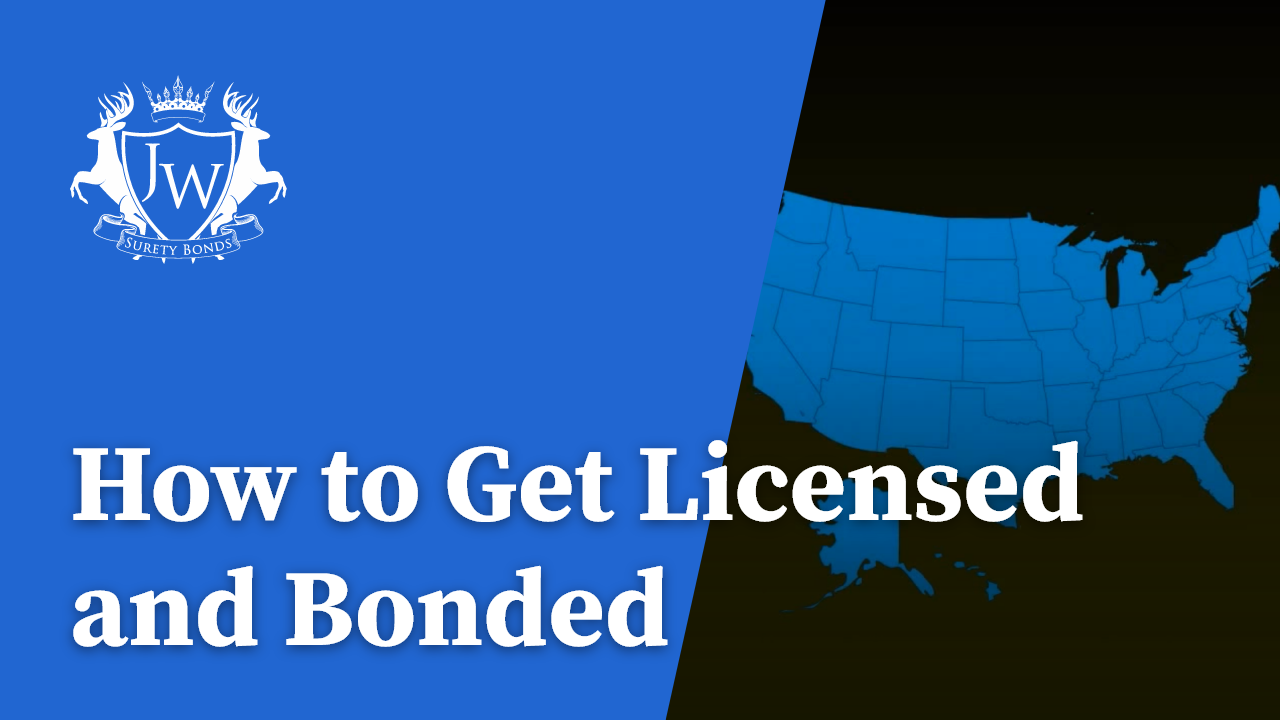How to Get Bonded and Insured: A Complete Guide
Ready to Get Started?
Get a real-time quote today.
When starting a new business, most entrepreneurs begin their research by asking, how do I get bonded and insured?
Getting bonded provides great comfort to potential clients and insurance protects businesses from risks that could put them out of business.
Therefore, it’s crucial for all business owners to perform their due diligence to determine adequate insurance coverage and learn how to get bonded.
How to Get Bonded
In order to become bonded, you must first determine whether you need a surety or fidelity bond.
The important difference between the two is that surety bonds are required by a third party (usually the government) to protect itself or the public.
Fidelity bonds are insurance for you or your business.
These typically protect your business from employee theft.
Getting Bonded and Insured: Do You Need "Bond Insurance"?
Learning how to become bonded and insured is important for any business owner. However, it can often be a mistake to purchase your bonds and insurance together (often incorrectly referred to as "bond insurance").
Not everyone qualifies for surety bonding. So rather than asking how do you get bonded, a more appropriate question might be, can I be bonded?
The majority of insurance agencies can help you to get bonded, but unfortunately do not fully understand the bond market or have the resources to properly assist you in the event of a claim.
Insurance agencies know how to get you insured best but often broker their bond business to a bond MGU that knows how to handle claims and get you the best rate. This puts a middleman into the mix, which could result in delays and increased costs, both with your rate and the handling of potential claims.
What Does "Bonded" Mean?
Most small business owners want to get licensed, bonded, and insured to provide their clients peace of mind but often don't know what it means. So, how do bonds work and why can't most insurance agents provide anything other than a vague "bonded" definition?
In short, a bond is a type of insurance that acts as a form of credit to you. It will pay your customers if you fail to complete the agreed-upon work. Or, in the case of some commercial bonds, it pays the government if you default on contractual obligations, such as remitting sales tax. The required bond amounts vary depending on your business needs.
You can read our guide that explains what getting bonded means depending on your scenario.
If you are required to post a surety bond, it is imperative that you understand them by reading our article, "What's a surety bond?".
What Does Being Insured Mean?
Being insured means that if a claim is submitted, a third-party will pay, such as an insurance company or surety company. It protects you from paying full costs out of pocket at the time of the claim.
The Difference Between Being Bonded and Being Insured
A bond is a type of insurance, but it differs from your average insurance policy.
General business insurance policies (general liability, commercial property, workers compensation, etc.) pay your business in the event of a claim. They protect a business from significant financial losses if theft, property damage, or injury occurs.
Contrastingly, bonds pay the public or government if a claim is made against your business for defaulting on contractual obligations (the exception being fidelity bonds).
The other main difference between insured and bonded is that if a claim is made against a bond, you are obliged to pay back the bond provider. This may amount to as much as the full bond amount.
Why Being Insured and Bonded Really Matters
Being insured helps a company avoid financial losses in the event of a claim, while bonds give potential clients peace of mind. Contract bonds and other surety bonds are also required to lawfully operate certain businesses. Overall, it can help secure your business’ future and give it the financial security to thrive.
Do I Need to Be Bonded, Insured, or Both?
Both large companies and small businesses should have insurance policies in place to protect against financial losses in the event of theft, injury, or disaster. An optional fidelity bond can increase your protection by providing insurance against employee theft.
However, in some cases, a bond is not optional—it is required by an obligee (such as a government agency) for a business to operate lawfully. For example, it may be needed to procure a license or bid on public construction projects.
Which Bond Do You Need?
There are various types of bonds and the one you need will depend on your situation or industry. If you're unsure of which bond type you need, you can use our find your bond tool, or simply contact one of our surety bond experts.
How to Get a Surety Bond
At this point you are likely asking; how do I get a surety bond? Surety bonds are offered by the industry through licensed agents. Unfortunately, the required license falls under property and casualty insurance, so most agents offering bonds primarily sell insurance products and do not fully understand the surety markets or how to assess your liability.
When it comes to surety bonds, you are responsible to pay for claims. Therefore, the question you should be asking is where do I get a surety bond? It’s imperative that you obtain a surety bond from an agency that either has a full-fledged bond department or exclusively offers bonds.
The majority of agents do not know how to get a surety bond with bad credit. Not everyone qualifies for surety bonds, so applicants with credit issues need to be placed with a high risk bond program. Most agents do not have direct access to these specialty high risk bond programs, and will likely broker your bond to a large bond agency with access. You can also take a look at our most frequently asked surety bond questions. Lastly, it's crucial that you work with an expert in the industry. Learn more about how to ensure you choose the proper bond company.

Getting Licensed & Bonded
One of the most common surety bond requirements is a license bond. So how do you get licensed, bonded and insured?
Like all surety bonds, license bonds must be required by a third party. If your profession does not require a license, you cannot get licensed and bonded but should still get insured. If your line of work requires you to obtain a license, you'll need to ask if a surety bond must be posted with your application. You can also search our database of license bond requirements by state.
Some of the most common surety bonds required to obtain a license include auto dealer bonds, contractor license bonds , and freight broker bonds.
Cost of Getting Bonded
At this point, you may be wondering, how much does it cost to get bonded and insured? While insurance products have become increasingly commoditized over the years, surety bond costs are not one size fits all. The surety bond rate is determined by an underwriter who assesses your risk of triggering a claim. Keep in mind, surety bonds are not insurance for your company, but a form of credit to you.
To determine costs, you need to get a quote from a licensed surety bond provider. If an agency is advertising a set cost for a bond, they are almost always listing the lowest possible rate, not necessarily what you’ll be paying.
Bonded Employees
Now that you know the basics of surety bonding, you may be asking, how do I get bonded for my business? Fidelity bonds provide insurance protection for your company. There is a wide range of fidelity bonds. For example, employee dishonesty bonds insure your company from theft or damage should an employee commit forgery or embezzle funds.
Some fidelity coverage is specific to certain lines of work. One familiar to most is a janitorial and cleaning bond, as the coverage provides homeowners and businesses they service peace of mind that the company can reimburse them in the event of theft. There are some fidelity bonds that are appropriate for any business. ERISA bonds are one of the few fidelity bonds required of businesses, as they protect employee benefit plans.
It’s important to know that fidelity coverage protects your business and more than one fidelity product may be a good fit for your needs.
The Consumer's Guide to Surety Bonds E-Book
If you want the most thorough answers available to all of the fundamental questions related to getting a surety bond (such as "how do you get bonded and insured?"), you can download our free "Consumer's Guide to Surety Bonds" e-book. The topics covered in the e-book include:
- How surety bonds work
- How indemnity agreements affect you
- The various surety bond types required
- Surety bond pricing
- How to get bonded
- How claims affect you
This e-book was created with first time applicants in mind, and is an excellent resource if you're unfamiliar with how surety bonds work, pricing and how they can greatly affect you or your business.

Summary
While most business owners are interested in getting bonded, different bonds serve different purposes. Surety bonds are required by the government to protect the public. Some surety bonds are required of businesses to obtain a license, while construction surety bonds (e.g. bid bonds and performance bonds) are required for specific jobs. Fidelity bonds are typically in place to protect the business itself and are at times a requirement as well.
Bonds are often misunderstood, even by insurance agents licensed to sell them. To ensure that you obtain the correct bonds, at a good rate, and with superior claims support, it's important to work with an agency that specializes in bonds and not insurance.
